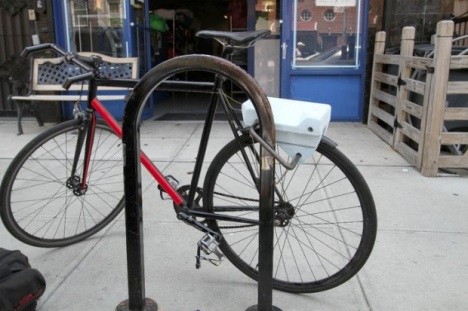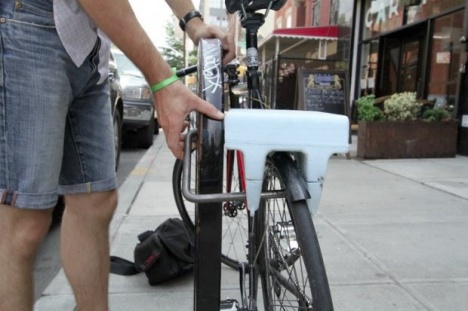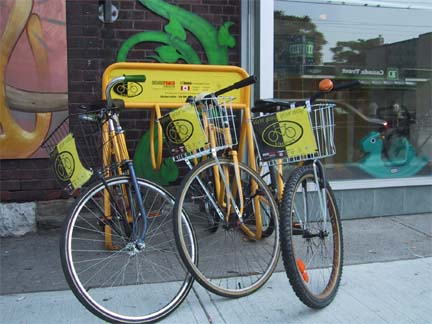
Sami recently wrote about the new Sobi bike system; It is a wonderful concept, and very different from bike sharing systems we have seen in Paris, Montreal and other cities. Urban systems like Velib in Paris or Bixi in Montreal are expensive to set up and maintain.
Sobi (Social Bicycle System) is a simpler system. CrunchGear explains that it is based on smart phone technology; instead of being attached to a fixed stand, it relies on GPS and mobile communications, and a big, secure lock that can attach to any bike rack, or any bike for that matter.

It is really clever; the works are in the bike lock. Instead of going to a bike stand like you do in Paris, your smart phone or computer tells you where the nearest bike is. At night they are supposed to be returned to a hub location, and if you do not take it back, you get charged two bucks. But any other user can see where out-of-hub bikes are on their smart phones and guess what, they get a bonus if they bring the bike back. Every user becomes part of the team that keeps the system working.

The finished lock acts as a carrier, has lights on the rear and is really solid.

It also fits on most regular bikes, eliminating the need for the heavy, expensive custom units that are used with Velib or Vixi. Because building them heavy and solid for low maintenance doesn't seem to make much difference.
Because the fact of the matter is, there are a lot of jerks out there, a lot of angry people, a lot of people with problems that cause them to steal and wreck things. As one commenter noted, "If it belongs to everyone, it belongs to no one, or as the Haitian expression goes, "The goat that is owned by the entire village will be left to die in the sun."
Last year the New York Times wrote:
Of the 15,000 bicycles originally disbursed for the program, more than half have disappeared, reports the BBC, presumed to be stolen. Some Velib customers have even taken to filming their Velib (mis)adventures and posting the destruction of the bikes on video-sharing sites like YouTube (shown above). The practice apparently even has its own catchy nickname: "Velib extreme."Nearly all of the original bikes have been replaced. At an estimated cost of roughly $500 each, the cost for replacing the entire fleet of 20,000 bikes would run about $10 million.
(Streetsblog writes that Reports of Vélib's Demise Greatly Exaggerated and that it was all a negotiating ploy by the operator.)

In Toronto, the Community Bicycle Network, a no-tech version using conventional bikes, failed because of the cost of the cost of dealing with lost and wrecked bikes, and a City Council too narrow-minded to come up with a few bucks to help them. (Toronto is now considering a bike-share system similar to Bixi, when they could have built on what they had.)

Perhaps Sobi, with its mix of cheaper bikes and GPS positioning, is the best compromise; They have less to lose, they know where the bikes are at all times, and they have put social networking to work with members looking out for misplaced bikes; perhaps they will all feel like they have a collective ownership in the system. If they add an accelerometer to detect when jerks ride down stairs or throw them off bridges (and perhaps even detect crashes and accidents) they might have the problems beat.
More at Sobi, where you can vote for them to get a Pepsi Refresh grant.
From Treehugger.com
